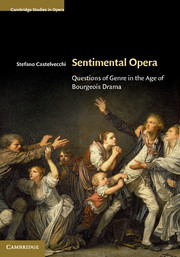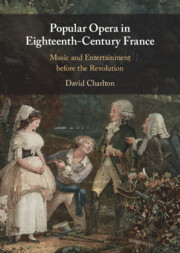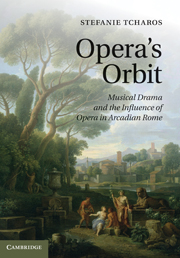Sentimental Opera
Questions of Genre in the Age of Bourgeois Drama
Part of Cambridge Studies in Opera
- Author: Stefano Castelvecchi, University of Cambridge
- Date Published: October 2013
- availability: Temporarily unavailable - available from TBC
- format: Hardback
- isbn: 9780521632140
Hardback
Other available formats:
Paperback, eBook
Looking for an inspection copy?
This title is not currently available for inspection. However, if you are interested in the title for your course we can consider offering an inspection copy. To register your interest please contact [email protected] providing details of the course you are teaching.
-
Sentimental Opera is a study of the relationship between opera and two major phenomena of eighteenth-century European culture - the cult of sensibility and the emergence of bourgeois drama. A thorough examination of social and cultural contexts helps to explain the success of operas such as Paisiello's Nina as well as the extreme emotional reactions of their audiences. Like their counterparts in drama, literature and painting, these works brought to the fore serious contemporary problems including the widespread execution of deserters, the treatment of the insane, and anxieties relative to social and familial roles. They also developed a specifically operatic version of the dominant language of sensibility. This wide-ranging study involves such major cultural figures as Goldoni, Diderot and Mozart, while refining our understanding of the theatrical genre system of their time.
Read more- Presents the first book-length treatment of the relationship between opera and sentimental culture in the eighteenth century, providing a new perspective on this complex topic
- Provides a thorough introduction to the theories and practices of bourgeois drama, investigating its emergence in depth
- Contains a detailed discussion of experiments in a sentimental operatic genre, refining our understanding of the genre system of Italian opera in general
Reviews & endorsements
'A valuable contribution not only to the study of late eighteenth-century opera but to our awareness of the priorities, absorptions and obsessions of cultured Europe on the eve of the French Revolution.' The Times Literary Supplement
Customer reviews
Not yet reviewed
Be the first to review
Review was not posted due to profanity
×Product details
- Date Published: October 2013
- format: Hardback
- isbn: 9780521632140
- length: 294 pages
- dimensions: 252 x 182 x 18 mm
- weight: 0.77kg
- contains: 13 b/w illus. 17 music examples
- availability: Temporarily unavailable - available from TBC
Table of Contents
Preface
A prologue on genre
1. Pamela goes to the opera
2. The emergence of bourgeois drama
3. The codification of bourgeois drama
4. Opera as drame
5. Sensibility and the moral cure
6. A sentimental opera
7. Sentimental, anti-sentimental
8. Avenues
Appendix: Bartolomeo Benincasa's preface to Il disertore (1784).
Sorry, this resource is locked
Please register or sign in to request access. If you are having problems accessing these resources please email [email protected]
Register Sign in» Proceed
You are now leaving the Cambridge University Press website. Your eBook purchase and download will be completed by our partner www.ebooks.com. Please see the permission section of the www.ebooks.com catalogue page for details of the print & copy limits on our eBooks.
Continue ×Are you sure you want to delete your account?
This cannot be undone.
Thank you for your feedback which will help us improve our service.
If you requested a response, we will make sure to get back to you shortly.
×




